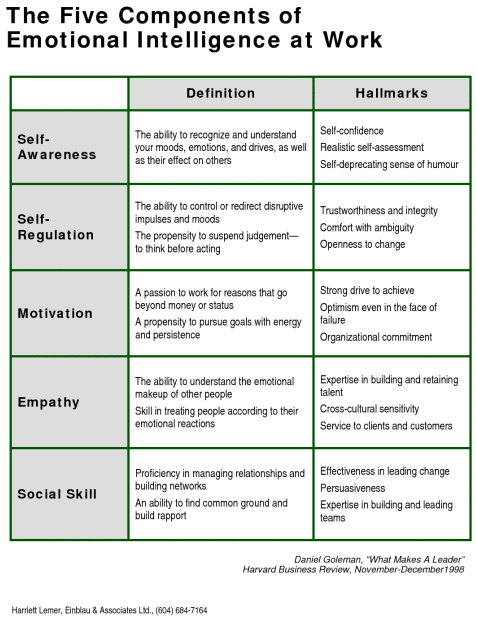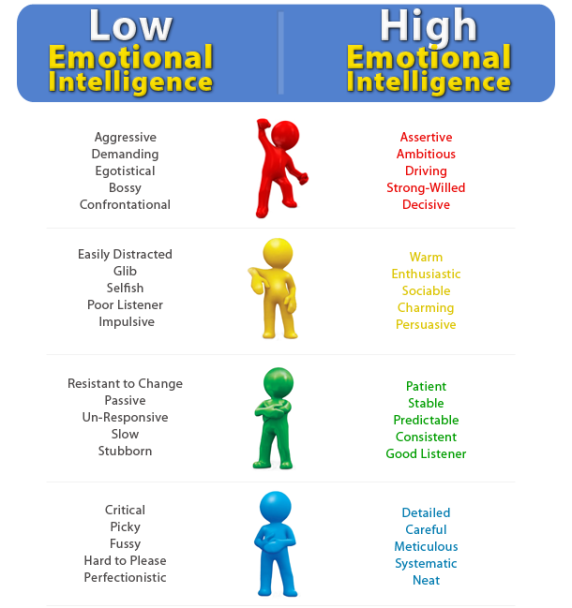In my last post on emotional intelligence I tried to give an overview of emotional intelligence. In this post I will try to gone through the components of emotional intelligence and the relative emotional competence framework. In the previous post I define EI as a form of intelligence relating to the emotional side of life, such as the ability to recognize and manage one’s own and others’ emotions, to motivate oneself and restrain impulses, and to handle interpersonal relationships effectively.
The concept of EI was originated by Daniel Goleman, psychologist, denoting the cluster of traits/abilities relating to the emotional side of life. The five components of emotional intelligence are visualized in the following figure:

The above stated components also shape the framework for emotional competence. Let us have a look on the details of these components:
Self Awareness
-
- Emotional Awareness: recognizing one’s emotions and their effect
- Accurate Self-assessment: knowing one’s strengths and limits
- Self-confidence: A strong sense of one’s self-worth
Self Regulation
-
- Self-control: Keeping disruptive emotions and impulses in check
- Trustworthiness: Maintaining standards of honesty and integrity
- Conscientiousness: Taking responsibility for personal performance
- Adaptability: Flexibility in handling change
- Innovation: Being comfortable with novel ideas, approaches and new information
Motivation
-
- Achievement drive: Striving to improve or meet a standard of excellence
- Commitment: Aligning with the goals of the group or organization
- Initiative: Readiness to act on opportunities
- Optimism: Persistence in pursuing goals despite obstacles and setbacks
Empathy
-
- Understanding others: sensing others’ feelings and perspectives, taking an active interest in their concerns
- Developing others: Sensing others development needs and bolstering their abilities
- Service orientation: Anticipating, recognizing, and meeting customers’ needs
- Leveraging diversity: Cultivating opportunities through different kinds of people
- Political Awareness: Reading a group’s emotional currents and power relationships
Social Skills
-
- Influence: Wielding effective tactics for persuasion
- Communication: Listening openly and sending convincing messages
- Conflict management: Negotiating and resolving disagreements
- Leadership: Inspiring and guiding individuals and groups
- Change Catalyst: Initiating or managing change
- Building bonds: Nurturing instrumental relationships
The emotional competences discussed above helps us to grow our emotional intelligence. The people may differentiate as “Person with Low Emotional Intelligence” and “Person with High Emotional Intelligence”. There are certain attributes that used to determine the level of emotional intelligence. The attributes are very mush distinguishable in terms of emotional competence. Have a look on the picture.
ll the five elements of emotional intelligence are important building blocks for relating to people and achieving their goals. Whatever stage of life and profession you are at; working on these elements of emotional intelligence will increase your chances of successfully achieving positive outcomes. By putting the pieces together and building someone’s own emotional intelligence. A person with high emotional intelligence is more resilient and dependable to offer inspirational leadership in guiding groups and people through change. It may bring someone as catalyst for change to others. So good luck.
First Part: Emotional Intelligence : Basic Overview (Part – 1)
Last Part: Emotional Intelligence: Techniques to Achieve High Level of Emotional Intelligence (last part)



Developing our emotional intelligence prepares us to excel in today’s workplace. We’re glad that the article and the video will help you to educate others.
Posted by Kazi Monoar | September 4, 2013, 3:46 pmYou are most welcome and thank you for your feedback on the article. People skills are no longer the “soft skills” in business. Instead, emotional intelligence is now recognized as the set of skills that differentiates great leaders from the mediocre.
Posted by Md. Moulude Hossain | September 19, 2013, 3:59 pmWith so much emphasis on teams and collaboration at work, emotional intelligence is now a coveted set of skills.
Posted by Monoar Khokon | October 10, 2013, 6:47 pmWith all the focus and media attention on emotional intelligence it is important to learn the facts about this theory. With its focus on the people side of management and leadership, EI skills are in high demand in many workplaces.
Posted by Maruful Hoque | January 5, 2014, 3:51 pmWe agree. Emotional Intelligence training is challenging. We have been taught to suppress our emotions at work and in society. For many, EI is an entirely new domain.
Posted by Md. Moulude Hossain | January 10, 2014, 4:00 pm